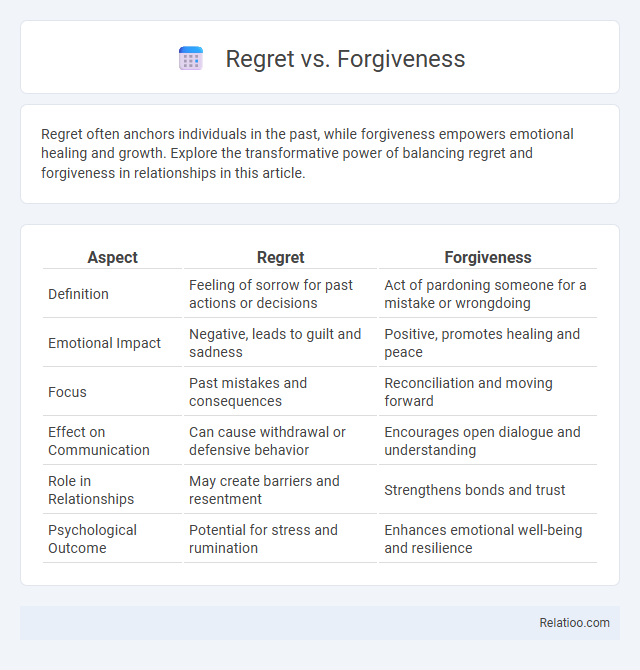Regret often anchors individuals in the past, while forgiveness empowers emotional healing and growth. Explore the transformative power of balancing regret and forgiveness in relationships in this article.
Table of Comparison
| Aspect | Regret | Forgiveness |
|---|---|---|
| Definition | Feeling of sorrow for past actions or decisions | Act of pardoning someone for a mistake or wrongdoing |
| Emotional Impact | Negative, leads to guilt and sadness | Positive, promotes healing and peace |
| Focus | Past mistakes and consequences | Reconciliation and moving forward |
| Effect on Communication | Can cause withdrawal or defensive behavior | Encourages open dialogue and understanding |
| Role in Relationships | May create barriers and resentment | Strengthens bonds and trust |
| Psychological Outcome | Potential for stress and rumination | Enhances emotional well-being and resilience |
Understanding the Concepts: Regret and Forgiveness
Regret involves feeling sorrow or remorse for past actions, highlighting the emotional response to mistakes or wrongdoings. Forgiveness, on the other hand, is the conscious decision to release resentment or anger toward someone who has caused harm, fostering emotional healing and personal growth. Your ability to distinguish between regret and forgiveness is crucial for cultivating emotional resilience and improving relationships.
Psychological Impact of Regret and Forgiveness
Regret often triggers intense psychological distress, including feelings of guilt, shame, and persistent rumination, which can exacerbate anxiety and depression. Forgiveness, however, promotes emotional healing by reducing negative emotions and fostering empathy, leading to improved mental well-being and resilience. Understanding how your mind processes regret and forgiveness can empower you to break free from emotional pain and enhance overall psychological health.
Regret: Causes and Common Triggers
Regret often stems from decisions made under pressure, lack of information, or misaligned values, leading to feelings of guilt and disappointment. Common triggers include missed opportunities, failed relationships, and actions that contradict personal morals. Recognizing these causes helps in addressing regret constructively and reducing its emotional impact.
The Healing Power of Forgiveness
The healing power of forgiveness transforms emotional pain by releasing you from the burden of regret and resentment. Unlike regret, which traps you in past mistakes, forgiveness promotes mental clarity, emotional resilience, and physical well-being, empowering your path toward inner peace. Embracing forgiveness fosters healthier relationships and nurtures self-compassion, essential components for genuine healing and personal growth.
How Regret Influences Decision-Making
Regret profoundly impacts decision-making by creating a mental simulation of alternative outcomes, which guides individuals to avoid repeating past mistakes and seek better future choices. This emotional response often leads to a cautious approach, weighing potential losses more heavily than gains, thus influencing risk assessment and behavioral adjustments. Forgiveness, by contrast, reduces the emotional burden of regret, enabling a more balanced evaluation of decisions without being overshadowed by past disappointments.
Steps to Move from Regret to Forgiveness
Moving from regret to forgiveness involves acknowledging your mistakes and accepting responsibility without self-condemnation. You must practice self-compassion by understanding that errors are part of human growth, then consciously choose to release resentment toward yourself or others. Your path includes reflecting on lessons learned and committing to positive change, which fosters emotional healing and personal empowerment.
Emotional Consequences of Holding onto Regret
Holding onto regret intensifies emotional distress, often leading to prolonged feelings of sadness, guilt, and anxiety that can hinder Your mental well-being. Forgiveness acts as a psychological release, reducing negative emotions by promoting acceptance and emotional healing. Unlike regret, forgiveness transforms emotional consequences into personal growth and resilience, fostering healthier relationships and improved self-esteem.
Forgiveness: Myths and Misconceptions
Forgiveness is often misunderstood as forgetting or excusing harmful actions, but it actually involves consciously choosing to release resentment and anger while maintaining personal boundaries. You can forgive without condoning the behavior or reconciling with the offender, which debunks the myth that forgiveness requires reconciliation. Research shows that forgiveness improves mental health, reduces stress, and fosters emotional well-being, distinguishing it clearly from the feelings of regret or guilt.
Cultivating Self-Forgiveness for Personal Growth
Cultivating self-forgiveness is essential for transforming regret into personal growth by allowing individuals to release guilt and embrace learning from past mistakes. Forgiveness fosters emotional healing, reduces negative self-judgment, and promotes a positive mindset necessary for overcoming setbacks. Emphasizing self-compassion and acceptance enhances resilience, empowering individuals to move forward with greater self-awareness and inner peace.
Finding Balance: Embracing Both Regret and Forgiveness
Finding balance between regret and forgiveness involves acknowledging past mistakes while cultivating compassion for oneself and others. Embracing regret offers valuable lessons that drive personal growth, whereas forgiveness facilitates emotional healing and the release of resentment. Harmonizing both allows for a healthier mindset, promoting resilience and improved mental well-being.

Infographic: Regret vs Forgiveness
 relatioo.com
relatioo.com